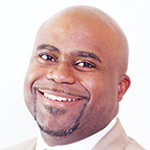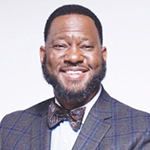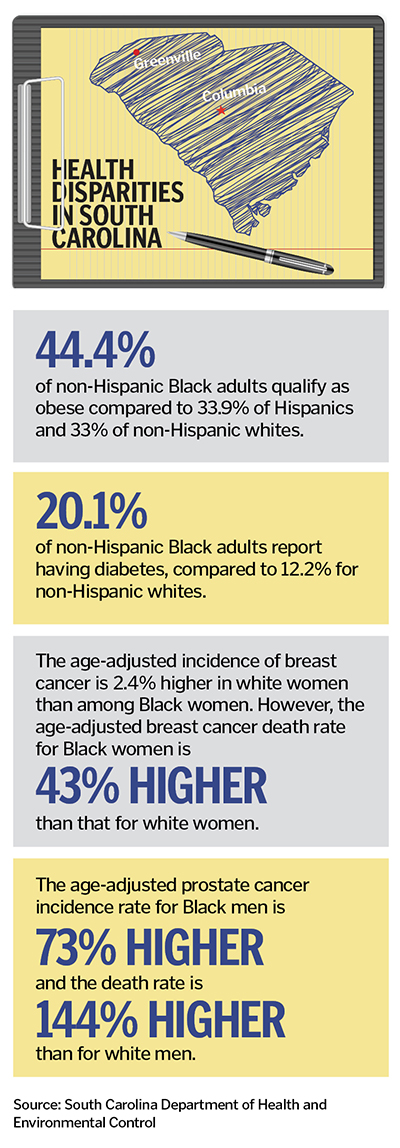Last year, Roy Williams joined one of the residents of the shelter he heads in Greenville, South Carolina, for a discussion on Black men's risk of getting colorectal cancer. Throughout the talk, as the clinician presenter listed symptoms of the illness,
the man repeatedly leaned over to Williams to say he had those symptoms.
After the presentation, which was at a church, the man took one of the colorectal cancer screening kits offered free to attendees. He completed the kit, submitted it and later was relieved to receive a negative result, Williams recalled.
Williams noted that although the man largely had avoided health care providers previously, he went to this talk because it was in a place he felt comfortable and with people he trusted, including Williams. The man found that the people there "respected
him and showed him they cared for him and that he mattered. They gave him the opportunity to change his trajectory" when it came to caring for his health, said Williams, who is the director of Spartanburg, South Carolina's Miracle Hill Rescue Mission.
Williams and about three dozen other leaders of Greenville faith-based organizations who are part of the Greenville Awareness and Community Engagement group, or GACE, believe relationship-building and empowerment are key to engaging Black men and women
in tackling the health concerns that are plaguing them and their loved ones.
Greenville's Bon Secours St. Francis Health System convened the group of clergy — most of whom head Black congregations or missions — to provide insights on what health and wellness issues are of most concern to Black community members. The
clergy group focuses on ways to get at those concerns. Bon Secours St. Francis recently merged this group with a similar one representing the Hispanic community, which brings GACE's count to about 45 faith and mission leaders.
 Dogan
DoganTaking the bull by the horns
Sean Dogan, a pastor who is the community health director of Bon Secours St. Francis, said GACE started in early 2020 when Bon Secours St. Francis President Matthew Caldwell held town hall-style meetings
with Bon Secours St. Francis associates of minority backgrounds to get their perspective on how to address inequity. One of the ideas was to form a clergy council to advise on health topics important to the Black community. The idea was sidelined
when COVID-19 struck. When Dogan was hired in 2021, he revived it.
He approached the leaders of Black churches throughout Greenville to invite them to the GACE group and got an overwhelmingly enthusiastic response. "This clergy council took the bull by the horns," Dogan said, in hopes of using the power of the pulpit
to galvanize people of color to focus more on their health.
The clergy group since has met a couple dozen times with Dogan and other Bon Secours St. Francis community health leaders to discuss concerns of church congregants. "It's an organic conversation," said Dogan. Among the health issues the group has surfaced
are colorectal cancer, prostate cancer, hypertension, diabetes and mental health.
An analysis from the South Carolina Department of Health and Environmental Control bears out that there is
a disparity in health outcomes for people of color in the state. For instance, non-Hispanic Blacks have a higher incidence than whites for numerous conditions, including obesity, prediabetes and diabetes. And Black people have a higher death rate
than white people for heart disease, breast cancer and prostate cancer.
Right around the corner
Once they identify the health concerns to target, GACE pastors work with Bon Secours St. Francis staff, particularly in the community health department, to develop educational campaigns for the pastors' churches
to address those health issues. The group also has advised Bon Secours St. Francis on how it can respond to the health issues in a way that will resonate with the community.
GACE pastors' churches have hosted Bon Secours St. Francis clinicians to present workshop discussions on colorectal cancer and prostate cancer. Bon Secours St. Francis has used mission outreach program grant dollars from the Bon Secours Mercy Health Foundation
to provide free cancer screening kits to the workshop attendees. Bon Secours St. Francis has supplied flyers on health topics for GACE churches to post.
The GACE group also has been engaging barbers and stylists who go to the pastors' churches in a barbershop and beauty salon outreach effort. Those shops have received free training on how to talk about health topics with their clients and encourage them to address health concerns.
 Mills
MillsGACE faith leaders are well-connected to other organizations in the community that are working to reduce health disparities. GACE member Stacey Mills is executive director of the Greenville Racial Equity and Economic Mobility Commission and senior pastor at Greenville's Mountain View Baptist Church. Founded by the United Way of Greenville County, the Urban League of the Upstate and the Greenville Chamber, the commission convenes local leaders to address matters of racial inequity,
social justice and disparities, including those having to do with health.

Mills recently brought together GACE and the commission to host a community mental health discussion at one of the barbershops that had taken part in the barbershop initiative on a day the shop was closed. Mills said community members so appreciated the
opportunity to speak candidly about mental health that they were eager to talk more. GACE and the commission plan to host more such events.
Feeling heard, believed
Bon Secours St. Francis, which has two hospital campuses in Greenville, has benefited from the insights of the GACE faith leaders. Those leaders have helped pinpoint neighborhoods lacking health care access,
so Bon Secours St. Francis can dispatch its mobile health clinic to those areas and so leaders can look into longer-term solutions. Bon Secours St. Francis also has set up food donation "blessing boxes" and provided grocery gift certificates to residents
in food deserts flagged by GACE members.
Mills and Williams said GACE's efforts have made a big difference to their churches and the broader community. Mills said that deep-seated and long-standing trust concerns have in the past hindered Black community members from accessing health care. Additionally,
Williams said, many community members have hesitated to get potentially problematic symptoms checked out. Mills added that many community members wait until they have a health crisis to seek care.
Mills and Williams said that because GACE's efforts reach community members where they are and since the efforts are delivered in a community-informed way, the GACE initiatives are breaking through the trust barrier.
Mills noted that he and other pastors now are discovering that they can turn to the health care professionals they're meeting through GACE efforts as a resource for when congregants have health questions. The pastors also have formed a tight-knit group
with one another, and that is enabling them to have a new level of local support.
Mills said through GACE the pastors are seeing their congregants becoming more empowered about their health and addressing lingering conditions. Mills' wife saw a flyer from a GACE event with information on where to get a mammogram locally. That flyer
prompted her to get her first mammogram this spring at age 49. That screening showed that she had a breast cancer that warranted surgical intervention. She since has had a double mastectomy, and her clinicians are following up to diagnose another
invasive cancer detected during her treatment.
Mills credited GACE with making important strides in the Black community and establishing a solid foundation, including when it comes to pointing out and addressing local health inequities. "For us to partner with this major health care provider in the
community — we feel we've been seen, heard and believed," he said.